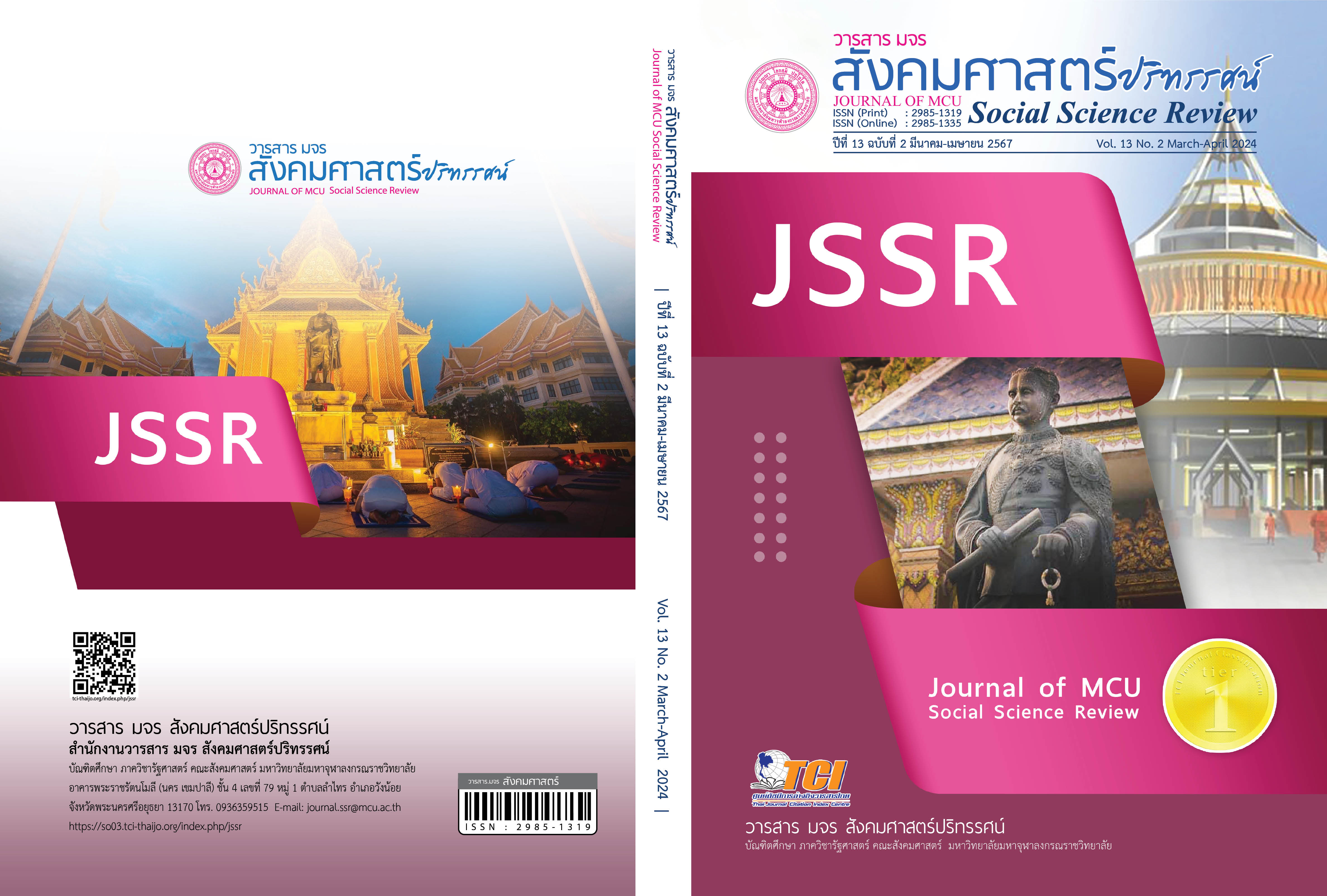THE INFLUENCES OF CORPORATES SOCIAL RESPONSIBILITY ON FIRM FINANCIAL PERFORMANCE OF LISTED COMPANIES IN THE STOCK EXCHANGE OF THAILAND
Keywords:
Corporate Social Responsibility, Firm Financial Performance, SET 100Abstract
Objectives of this research article were: 1. To study the influence of corporate social responsibility on financial performance in terms of return on assets. 2. To study the influence of corporate social responsibility on financial performance, finance in terms of return on equity ratio of companies listed in the Stock Exchange of Thailand, conducted by the quantitative research that collected data from companies with top 100 operating results between 2019-2021 Findings were found that there were 79 companies with complete data necessary for analysis, a total of 237 data. Corporate social responsibility (CSR) was a variable predicting financial performance. This research determined that the control variables were Size of the business. Ratio of tangible assets to total assets. Debt to total assets ratio. Depreciation to total assets ratio and dividends paid. Data were analyzed using multiple regression.
The research results were found that Corporate social responsibility had no influence on financial performance in terms of return on assets (ROA) and return on equity (ROE). This research can create new knowledge for the business units for policy implementation to stimulate awareness of social responsibility of the business sector in Thailand.
References
Ajina, A. S., et al. (2019). The importance of CSR initiatives in building customer support and loyalty: Evidence from Saudi Arabia. Asia Pacific Journal of Marketing and Logistics, 31(3), 691–713.
Ang, R., et al. (2022). The relationship between CSR and financial performance and the moderating effect of ownership structure: Evidence from Chinese heavily polluting listed enterprises. Sustainable Production and Consumption, 30, 117–129.
Ben Saad, S., & Belkacem, L. (2022). How does corporate social responsibility influence firm financial performance? Corporate Governance. The International Journal of Business in Society, 22(1), 1–22.
Bird, R. D. et al. (2007). What Corporate Social Responsibility Activities are Valued by the Market?. Journal of Business Ethics, 76(2), 189–206.
Bowen, H. R. (1953). Social Responsibility of the Businessman. Harper and Row.
Carlini, J., & Grace, D. (2021). The corporate social responsibility (CSR) internal branding model: Aligning employees’ CSR awareness, knowledge, and experience to deliver positive employee performance outcomes. Journal of Marketing Management, 37(7–8), 732–760.
Cho, S., et al. (2019). Study on the Relationship between CSR and Financial Performance. Sustainability, 11(2), 343.
Hahn, R. (2013). ISO 26000 and the Standardization of Strategic Management Processes for Sustainability and Corporate Social Responsibility: ISO 26000 and Strategic Management Processes. Business Strategy and the Environment, 22(7), 442–455.
Hillman, A. J., & Keim, G. D. (2001). Shareholder Value, Stakeholder Management, and Social Issues: What’s the Bottom Line?. Strategic Management Journal, 22(2), 125–139.
Koojaroenprasit, S., & Pumpinyo, S. (2019). Behavior of Adoption of a Low Carbon Society: A Case Study of Bangkok, Thailand. Retrieved March 20, 2022, from https://shorturl.asia/aGnQC
Lima, C. V., et al. (2011). Corporate social responsibility, firm value and financial performance in Brazil. Social Responsibility Journal, 7(2), 295–309.
Lu, W., et al. (2018). The paradoxical nexus between corporate social responsibility and sustainable financial performance: Evidence from the international construction business. Corporate Social Responsibility and Environmental Management, 25(5), 844–852.
Martínez-Ferrero, J., & Frías-Aceituno, J. V. (2015). Relationship Between Sustainable Development and Financial Performance: International Empirical Research: Corporate Social Responsibility, Financial Performance. Business Strategy and the Environment, 24(1), 20–39.
Orlitzky, M., et al. (2003). Corporate Social and Financial Performance: A Meta-Analysis. Organization Studies, 24(3), 403–441.
Rhou, Y., et al. (2016). CSR and financial performance: The role of CSR awareness in the restaurant industry. International Journal of Hospitality Management, 57, 30–39.
Stuart, A. C., et al (2021). Corporate Social Responsibility Disclosures and Investor Judgments in Difficult Times: The Role of Ethical Culture and Assurance. Journal of Business Ethics, 171(3), 565–582.
Sustainable Business Development Institute. (2013). Social Responsibility for Corporate Sustainability. Bangkok: IDEOL Digital Print.
Suto, M., & Takehara, H. (2021). Impact of corporate social responsibility intensity on firm-specific risk and innovation: Evidence from Japan. Social Responsibility Journal, 18(3), 484-500.
Texas A&M International University, et al. (2012). Lateral Collinearity and Misleading Results in Variance-Based SEM: An Illustration and Recommendations. Journal of the Association for Information Systems, 13(7), 546–580.
Titko, J., et al. (2021). Differences in Attitude to Corporate Social Responsibility among Generations. Sustainability, 13(19), 1-12.
Úbeda-García, M., et al. (2021). Corporate social responsibility and firm performance in the hotel industry. The mediating role of green human resource management and environmental outcomes. Journal of Business Research, 123, 57–69.
Downloads
Published
How to Cite
Issue
Section
License
Copyright (c) 2024 Journal of MCU Social Science Review

This work is licensed under a Creative Commons Attribution-NonCommercial-NoDerivatives 4.0 International License.
In order to conform the copyright law, all article authors must sign the consignment agreement to transfer the copyright to the Journal including the finally revised original articles. Besides, the article authors must declare that the articles will be printed in only the Journal of MCU Journal of Social Sciences. If there are pictures, tables or contents that were printed before, the article authors must receive permission from the authors in writing and show the evidence to the editor before the article is printed. If it does not conform to the set criteria, the editor will remove the article from the Journal without any exceptions.





